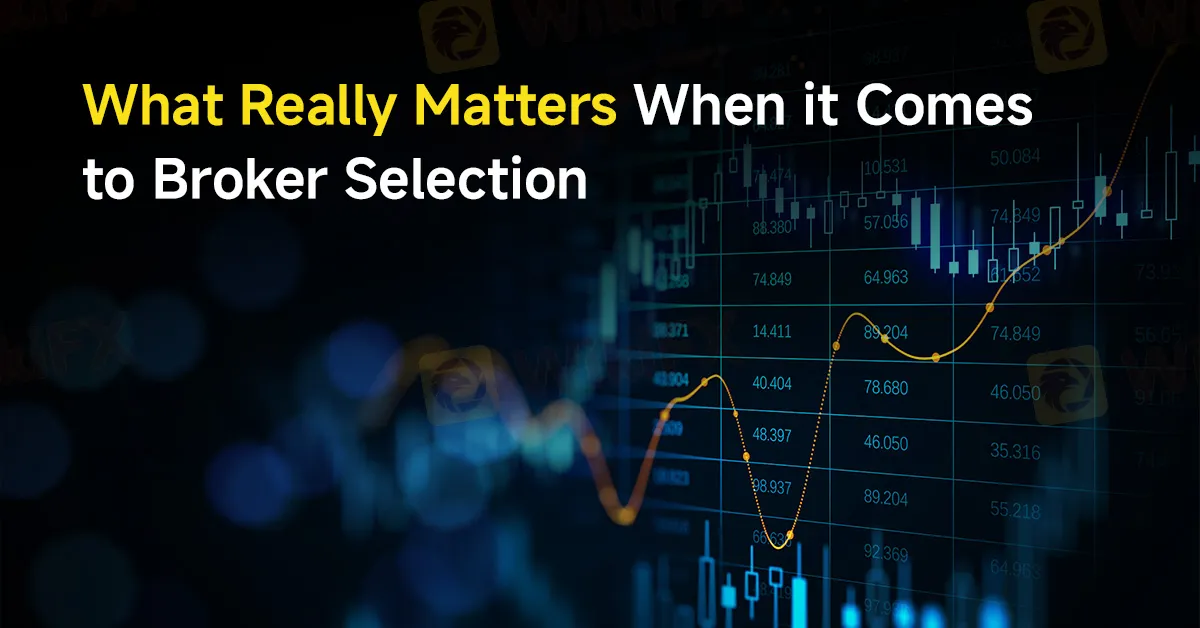简体中文
繁體中文
English
Pусский
日本語
ภาษาไทย
Tiếng Việt
Bahasa Indonesia
Español
हिन्दी
Filippiiniläinen
Français
Deutsch
Português
Türkçe
한국어
العربية
What Really Matters When it Comes to Broker Selection
Abstract:Selecting the right broker is a critical decision for traders, impacting their overall trading experience and success. A recent study by FXStreet, which surveyed traders with active accounts, highlights the primary considerations that influence this choice. Security, regulatory compliance, ease of transactions, and favourable trading conditions top the list of priorities for traders.

Selecting the right broker is a critical decision for traders, impacting their overall trading experience and success. A recent study by FXStreet, which surveyed traders with active accounts, highlights the primary considerations that influence this choice. Security, regulatory compliance, ease of transactions, and favourable trading conditions top the list of priorities for traders.

Security stands as the cornerstone of broker selection. Traders seek brokers with solid reputations and strong regulatory compliance. A broker‘s reputation often serves as an initial indicator of its reliability. Word-of-mouth recommendations from trusted peers and targeted advertisements are significant in sparking interest. However, the trust-building process extends beyond the initial introduction, requiring a thorough evaluation of the broker’s regulatory standing and the efficiency of their withdrawal processes.
Regulatory compliance is particularly crucial. Regulatory bodies such as the U.S. Securities and Exchange Commission (SEC) and the Financial Conduct Authority (FCA) provide a framework that brokers must adhere to, ensuring a certain level of security and fairness. Traders favour brokers who are transparent about their regulatory status and adhere to stringent compliance standards.

The efficiency of deposit and withdrawal processes is another critical factor. Traders prioritize brokers that offer smooth and swift transactions, minimizing any potential disruptions to their trading activities. A seamless withdrawal process is particularly vital as it directly affects a traders ability to access their funds when needed.

Traders also look for brokers that offer favourable trading conditions. This includes competitive spreads, low commissions, and high-quality trade execution. During the evaluation phase, many traders use demo accounts to test these conditions without risking real money. This allows them to assess the brokers trading platform, the quality of trade execution, and the overall user experience.

The study also found a growing interest in proprietary trading models. Proprietary firms, or “prop firms,” offer traders the opportunity to trade with the firms capital after passing certain challenges. One respondent shared their experience, highlighting the appeal of instant funding and the potential to trade with significant capital. This model allows traders to leverage their skills without committing substantial personal funds initially.

Many traders choose to maintain accounts with multiple brokers. This strategy enables them to capitalize on the varying advantages offered by different brokers, such as competitive spreads, margin requirements, and unique user interfaces. By diversifying their broker relationships, traders can optimize their trading conditions and mitigate risks associated with any single broker.

In the quest for a trustworthy broker, platforms like WikiFX play an essential role. WikiFX is a global broker regulatory query platform that offers comprehensive information on brokers' regulatory status, reputation, and user reviews. By providing detailed insights and real-time data on brokers worldwide, WikiFX helps traders make informed decisions, ensuring they choose brokers with strong regulatory compliance and positive track records. This added layer of transparency and verification aligns perfectly with traders' priorities of security and reliability.
As the financial landscape continues to evolve, so do the criteria for selecting a broker. Technological advancements, regulatory changes, and shifting market dynamics will influence traders' decisions. Despite these changes, the fundamental importance of security and reliability remains constant. Traders will continue to seek brokers that provide a secure trading environment, robust regulatory compliance, and efficient transactional processes.

Disclaimer:
The views in this article only represent the author's personal views, and do not constitute investment advice on this platform. This platform does not guarantee the accuracy, completeness and timeliness of the information in the article, and will not be liable for any loss caused by the use of or reliance on the information in the article.
Read more

INFINOX Partners with Acelerador Racing for Porsche Cup Brazil 2025
INFINOX has teamed up with Acelerador Racing, sponsoring an Acelerador Racing car in the Porsche Cup Brazil 2025. This partnership shows INFINOX’s strong support for motorsports, adding to its current sponsorship of the BWT Alpine F1 Team.

The Daily Habits of a Profitable Trader
Every professional trader follows a structured approach to ensure they are well-prepared, disciplined, and able to seize opportunities with confidence. Whether you are a seasoned investor or an aspiring trader, adhering to a robust daily checklist can significantly enhance your performance. Use this checklist to check if you are a qualified trader

The Impact of Interest Rate Decisions on the Forex Market
Interest rate changes determine currency attractiveness, influencing capital flows and exchange rate trends. Understanding this mechanism helps investors navigate the forex market effectively.

How a Housewife Lost RM288,235 in a Facebook Investment Scam
A 47-year-old housewife in Malaysia recently fell victim to an online investment scam, losing a substantial sum of RM288,235 after engaging with a fraudulent scheme advertised on Facebook.
WikiFX Broker
WikiFX Broker
Latest News
TradingView Brings Live Market Charts to Telegram Users with New Mini App
Trump tariffs: How will India navigate a world on the brink of a trade war?
Interactive Brokers Launches Forecast Contracts in Canada for Market Predictions
Authorities Alert: MAS Impersonation Scam Hits Singapore
Stocks fall again as Trump tariff jitters continue
INFINOX Partners with Acelerador Racing for Porsche Cup Brazil 2025
Regulatory Failures Lead to $150,000 Fine for Thurston Springer
April Forex Trends: EUR/USD, GBP/USD, USD/JPY, AUD/USD, USD/CAD Insights
March Oil Production Declines: How Is the Market Reacting?
Georgia Man Charged in Danbury Kidnapping and Crypto Extortion Plot
Currency Calculator







